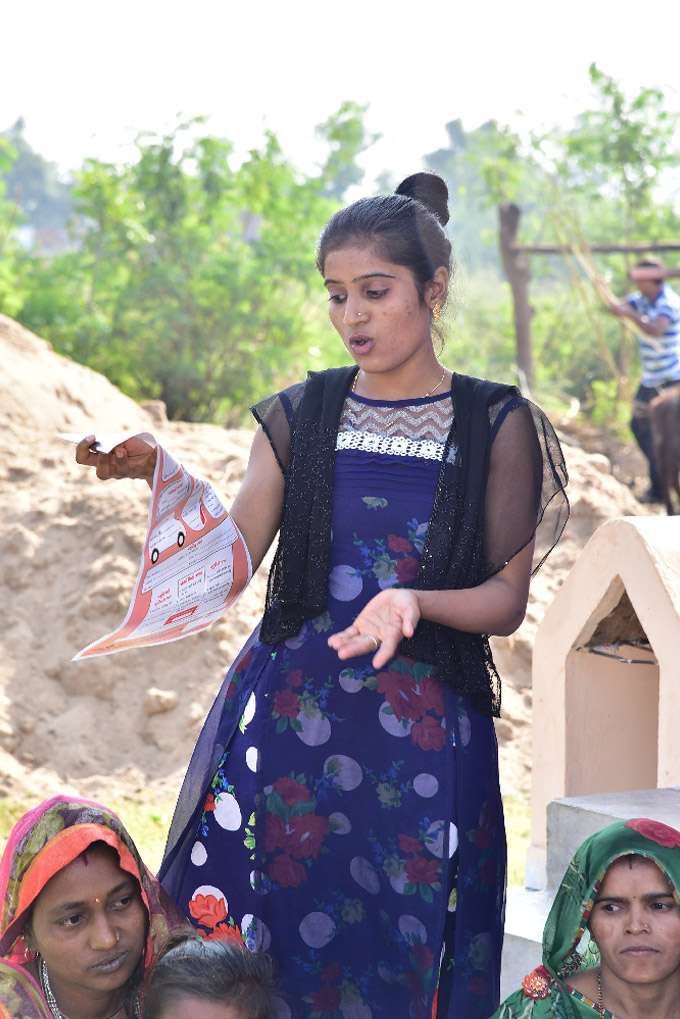She Never Gives Up
Kaushalya walked briskly to the anganwadi. Spotting Kaushalya’s jhola as she entered, she smiled. Kokilaben, the anganwadi karyakarta had already swept the place clean and laid out the ingredients and vessels to prepare the mid-day meal. One by one the children arrived. Their happy chatter reverberated through the room.
Punctuality and child attendance had been an issue when Kaushalya, a local young woman, began work as an arogya saathi, a community health monitor-counsellor with Aatapi. Monitoring and streamlining the functioning of anganwadis was one of her responsibilities. Believing that actions speak louder than words, Kaushalya was at the anganwadi before time. Going beyond the scope of her duties, she helped Kokilaben, the anganwadi karyakarta to prepare the mid-day meal to ensure they were served on time. Today Kokilaben ensures things happen on time, whether Kaushalya comes for an ‘inspection’ or not.
Kaushalya met the Aatapi team during a village event. Seeing her determination and keenness to do community work, they offered her the role of a Peer Leader. Her leadership skills were apparent in her interaction with the adolescent groups; Aatapi gave her greater responsibility, they made her an arogya saathi. Besides the anganwadi, Kaushalya monitored the functioning of the primary health and sub-centres. Mentored by Aatapi, Kaushalya, a member of Ujaas- Federation of women’s self help groups sharpened her people’s skills and understanding of local health issues. Chatting with them like a friend, she counselled pregnant and nursing mothers and ascertained that they took maximum advantage of government health and welfare schemes.

“I help them understand the importance of hygiene, sanitation and nutrition for our heallth and well-being. Proverbs come to my rescue. Beh haathe, taali waage, it takes two hands to clap. If we demand the best, we will get the best from public health services.

A pre-preparatory Mamta Divas meeting with young mothers and mothers to-be was next on her agenda for the day. She prided herself in ensuring a high turn up for the weekly Mamta Divas health check-up among her group.
Kaushalya’s last visit for the day was Urmilla. 20 year old Urmilla was in the third trimester of her pregnancy. “I am tired all the time,” Urmilla had complained to Kaushalya the first time she visited her. Alert as always, Kaushalya took Urmilla for her health check-up. Her haemoglobin was an alarming 4.7. Kaushalya visited her regularly and ensured that she took the iron tablets daily and ate an iron rich diet. “Your haemogloblin is 7 now. We need to raise the level further.” Kaushalya told Urmilla as she dismounted from her motorcycle.
Two and half month later, Urmilla gave birth to a healthy 3.2 kg baby boy.
“You’re a champion.” Urmilla told her as she thanked her.
“Not always,” Kaushalya retorted. “I could not plait my hair or cook a simple meal of roti-sabji, and passed my 12th class exam in the third attempt. Aatapi did not look at my weaknesses, they looked at my strengths.”
Anganwadi
Anganwadi is a type of rural child care centre in India. They were started by the Indian government in 1975 as part of the Integrated Child Development Services programme to combat child hunger and malnutrition. Anganwadi means “courtyard shelter” in Indian languages.
